“Sooner or later, all games become serious.” J.G. Ballard.
This is an article about the board game Suburbia, its expansions, app and sequels. It’s also an article about failure, corruption and Christmas spirit. At one point it mentions a urinating sot. These are scattered snippets of Suburbia.
Suburban Start
Christ, but I love industry. I can’t get enough of it. I just want everything to be hexagonal yellow, spewing out money and repulsing people like there’s no tomorrow. Give me a landfill site over affordable housing any day of the week. And then give me a lake to put next to it to contaminate for profit.
Ah, that feels good!
Sometimes I wonder if Suburbia is a Rorschach test, revealing my base desires for the material over the social. And then I just shrug and buy another heavy factory. I might have a problem.
Suburban Summary
In Suburbia players compete to have the most populous suburb, walking a tightrope between income and reputation (the amount of money and the number of people who move to your suburb at the end of each of your turns). Money can be spent on new properties (tiles) for your suburb which provide you with boosts to your income or reputation, or just immediate injections of money or people.
What you receive when you place a tile depends on its attributes, its placement in relation to its surrounding tiles and its interaction with other tiles in both your own and your opponents’ boroughs. My oh-so-addictive yellow industrial tiles, for instance, generally provide cash or income rewards but often tarnish a suburb’s reputation, particularly if positioned next to residential tiles. Factories may bring in the hard cash but nobody wants to live next door to one.
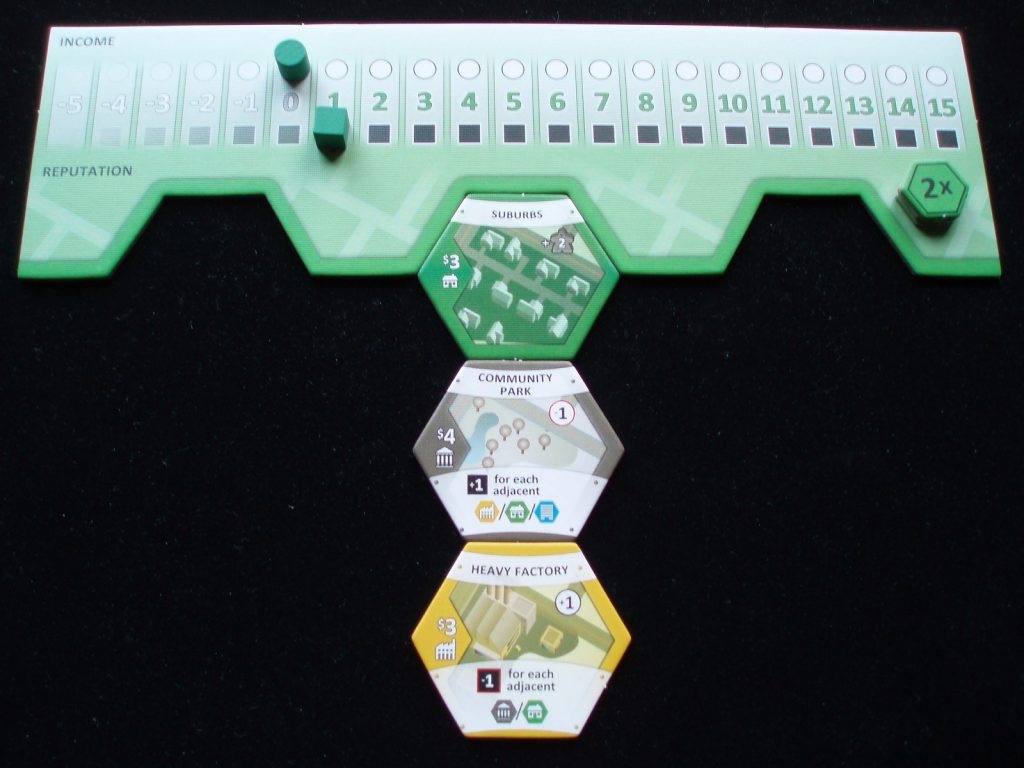
The final twist is the population track, a long and winding road littered with thick red lines. Cross one of these lines and both your income and reputation immediately drop a level, representing the increased bills and reduction to your small-town charm that come from a larger population. Since the winner is the player with the greatest population at the end of the game, the ‘score’ track doesn’t just sit off to the side like in most games but is fundamental to the whole experience, punishing success if you aren’t sufficiently prepared for it.
Suburban Scorn
When I was younger I knew that suburbs were the no man’s land between city and countryside, the worst of both with none of the good stuff.
Suburban Score
“I’m rockin’ the suburbs,” Ben Folds.
Suburbia is one of my favourite board games ever. Top 6 easy.
The reason Suburbia grips my heart so ferociously is down to the puzzle at its very core. The teasing balance between income and reputation and the way they intertwine with the tile placement system. The satisfying joy of creating property synergies that work neighbourly, locally and globally. And if chaos is a ladder then it’s got nothing on Suburbia’s population track, a gloriously simple concept that keeps the game tense throughout and means that players are competing against their own success as well as each other.
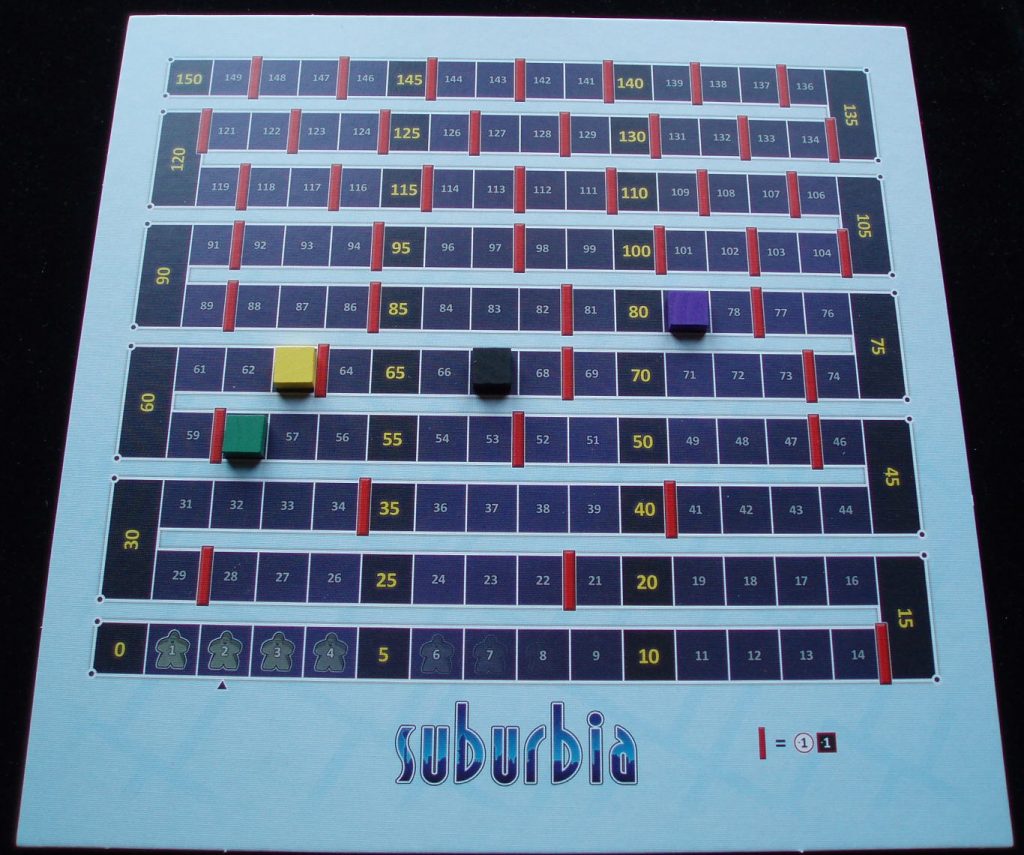
City building games aren’t unusual but it’s the way that the mechanisms and theme interact that stands Suburbia apart. Of course houses near schools attract more people than houses near factories – parents want their kids educated not irradiated. Everything makes sense so completely that after a quick rules explanation there are remarkably few queries. People, cash and two symbols are essentially all you need to know to get started. Everything else flows naturally from there.
The intuitive ruleset lets the game breathe, allowing you to fail or flourish as a result of your own decisions. It’s tight, it’s balanced and it’s brilliant. Importantly, it makes you feel smart as a result of good play whilst never making you feel truly stupid when you inevitably mess up. There’s a generosity and friendliness beneath its clinical exterior.
Suburban Sketch Part 1
I have an idea for an expansion that I’m calling Suburbia Government. It would consist of a series of laws that players could vote for at intervals through the game. Laws would incentivise the wishes of the government of the time, providing immediate bonuses for tackling popular initiatives such as building affordable housing or stimulating economic growth through industry.
Suburban Sheen
Let’s not beat around the bush, the standard edition of Suburbia could have been created using 1990’s clipart. And yet… once you adjust to its underwhelming appearance you realise that it’s functional and warm, reflecting both the innocence of the 1950’s and the cynicism of today. The clean design actively works to your advantage given the awareness you need to have for what’s going on in your opponents’ suburbs. With a glance you can see where everything is and understand the rippling outcomes of your next move.
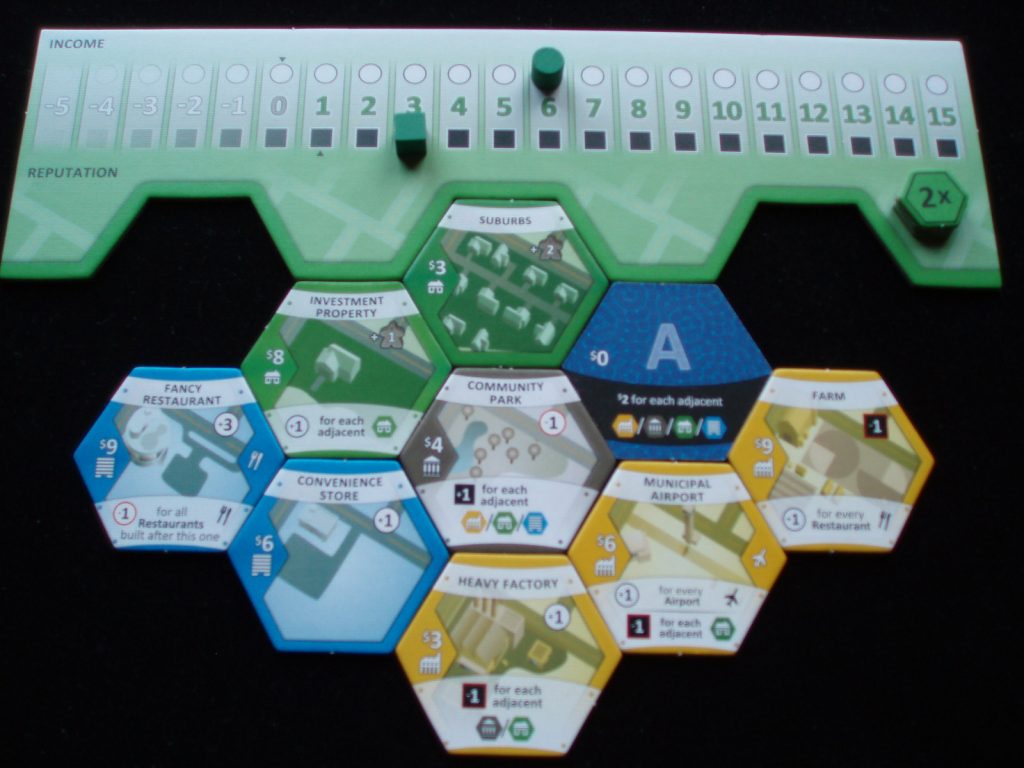
Suburban Statistics
Released: 2012.
Designer: Ted Alspach.
Publisher: Bézier Games.
Accolade: 2013 Mensa Select Award.
Current BoardGameGeek ranking: Lower than it should be.
Suburban Shine
The standard edition’s art may look like it was designed by a paperclip but Suburbia Collector’s Edition… well, that’s a different beast entirely. Raising a cool $1.8 million on Kickstarter, it’s a splendid box packed full of gorgeous artwork, deluxe components and exciting new tiles. Bigger, bolder and better/bloated (depending on personal taste) – Suburbia as it should have been treated and everything that this wonderful hobby of ours can be.
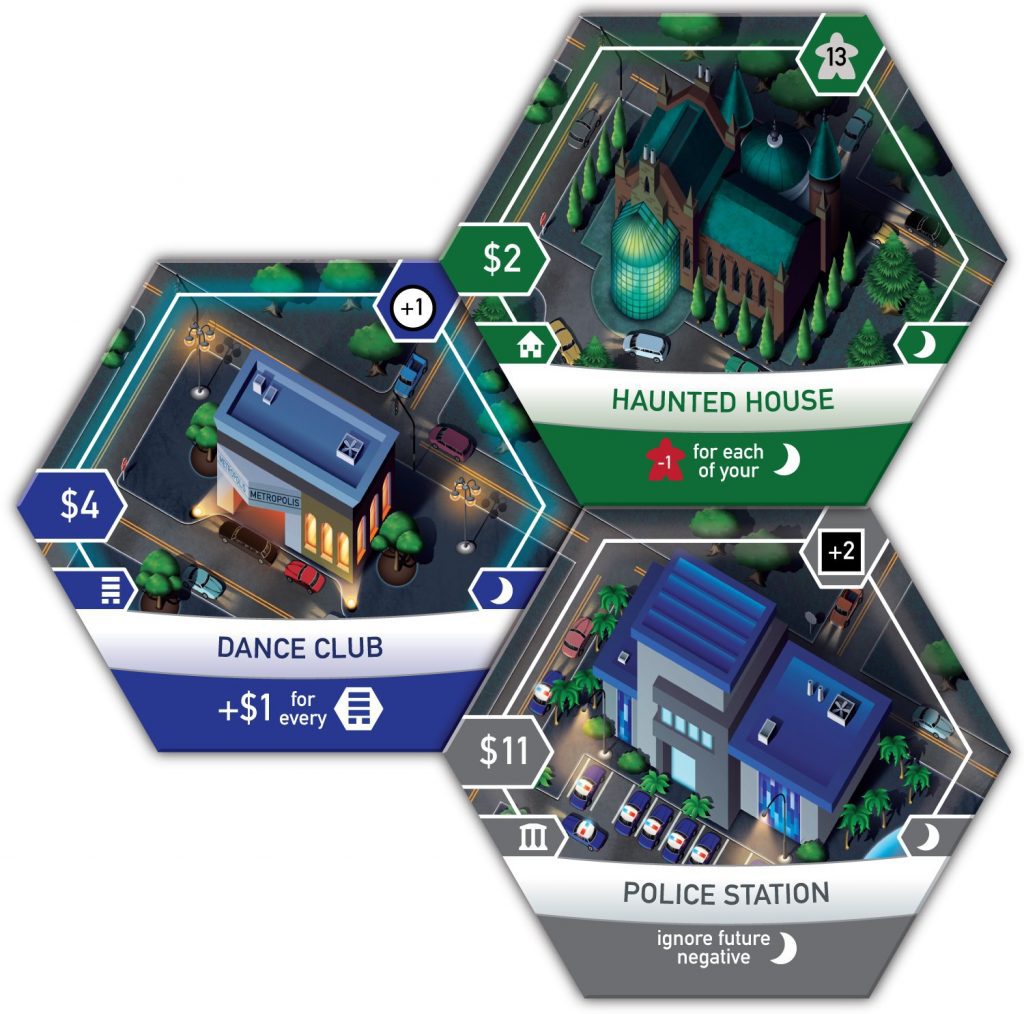
You might imagine that the Kickstarter for Suburbia Collector’s Edition in early 2019 got me pretty excited. It was pricey but my budget could just about stretch and, for someone who adores the game, it was surely an instant-back project?
Reader, I didn’t back it.
There are plenty of rational reasons for the decision (already owning most of the content, the expense, the increased shelf and table space required) but I chose a sentimental one. Some board games are treasures.
“Yeah, it seems I’m never letting go of suburbia.” Troye Sivan.
Suburban Siblings
Two years after the release of Suburbia, a spiritual sequel emerged on the scene: Castles of Mad King Ludwig. (The fascination with Ol’ Ludwig has resulted in subsequent spin-offs The Palace of Mad King Ludwig in 2017 and 2018’s Between Two Castles of Mad King Ludwig, the result of a collaboration between Bézier Games and Stonemaier Games.)
Castles of Mad King Ludwig (hereafter ‘Castles’) is flashier than Suburbia, has lovely artwork and is about building castles; sexy, sexy castles, with their portcullises, crenulations and murder holes. ‘Castles’ is the more eye-catching but that only highlights why I like Suburbia so much.
‘Castles’ is Suburbia trying too hard to be liked. Players are meant to be building castles to please a king who is a bit zany. When you commit a horrible room placement, he’s the only person who’d care and since he’s ‘mad’ perhaps he’ll like it anyway? Underneath the forced wackiness it’s all a bit meaningless.
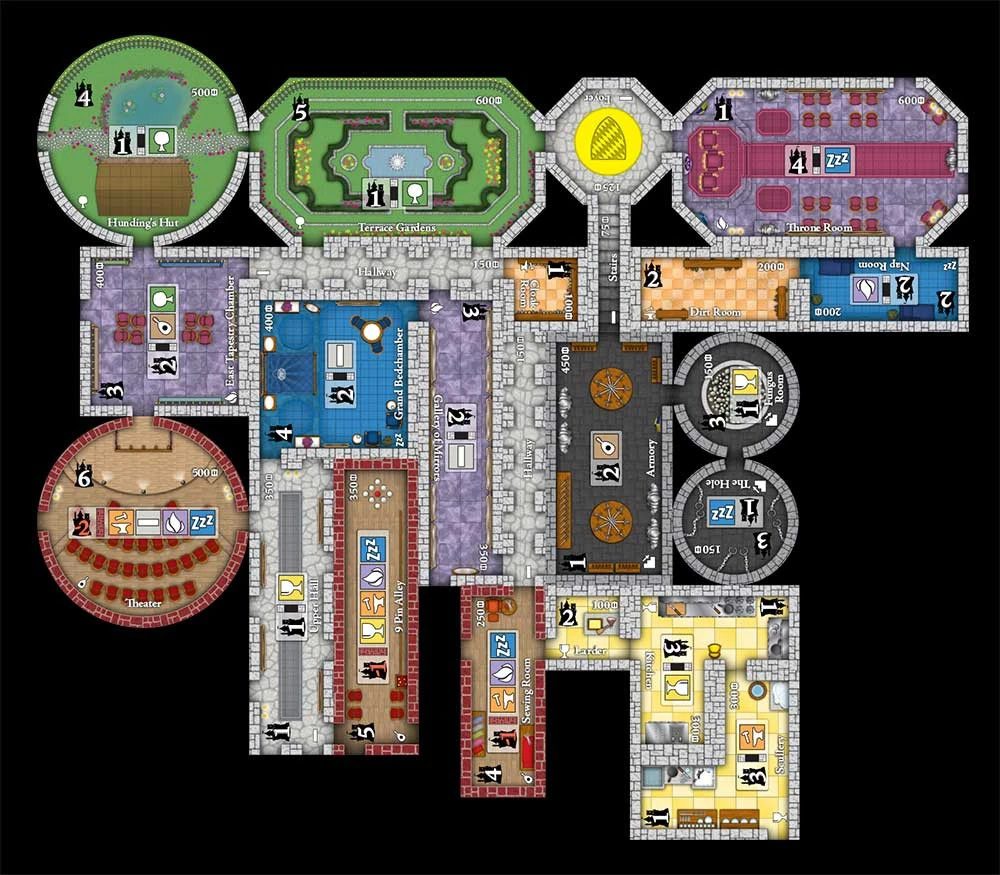
Suburbia’s outwardly drab theme is far stronger, resonating through every inch of the game. The stories told are more interesting, with an edge that the skin-deep style of ‘Castles’ is lacking. Those families that believed they were living the perfect life? Your incompetence has just landed them with a slaughterhouse for a neighbour. The humour is richer, deeper and darker. Suburbs might not be as attention-grabbing as castles but they’re more human.
Suburban Sketch Part 2
I have an idea for an expansion that I’m calling Suburbia Landscapes. It would consist of a series of player mats representing the lands upon which properties are built. Certain spaces would be free to build on, while others would have additional costs or benefits depending on what was originally there (floodplain, green belt land, former landfill sites, etc.) and the type of tile you wanted to build.
Suburban Spirit
What does ‘Christmas Spirit’ mean to you?
In films ‘Christmas Spirit’ is all grand gestures in cinematic locations with fluffy white snow and jingly music.
For me ‘Christmas Spirit’ is the many small kindnesses of strangers. It’s a broken-down car late Christmas night in an anonymous layby near St. Helens, England, the constant drizzle pattering the car windows whilst Lisa and I shiver. It’s passing motorists stopping to ask if they can help, offering to bring us something to eat or drink, offering to drive us somewhere else, offering us a blanket, offering anything they can. A constant stream of Samaritans.
Boxing Day morning, a day later than planned, we opened our presents to each other and there was Suburbia. My standard edition reminds me of my wife, of small kindnesses and of Gandalf, my first car. It reminds me that the best gifts are worth waiting for.
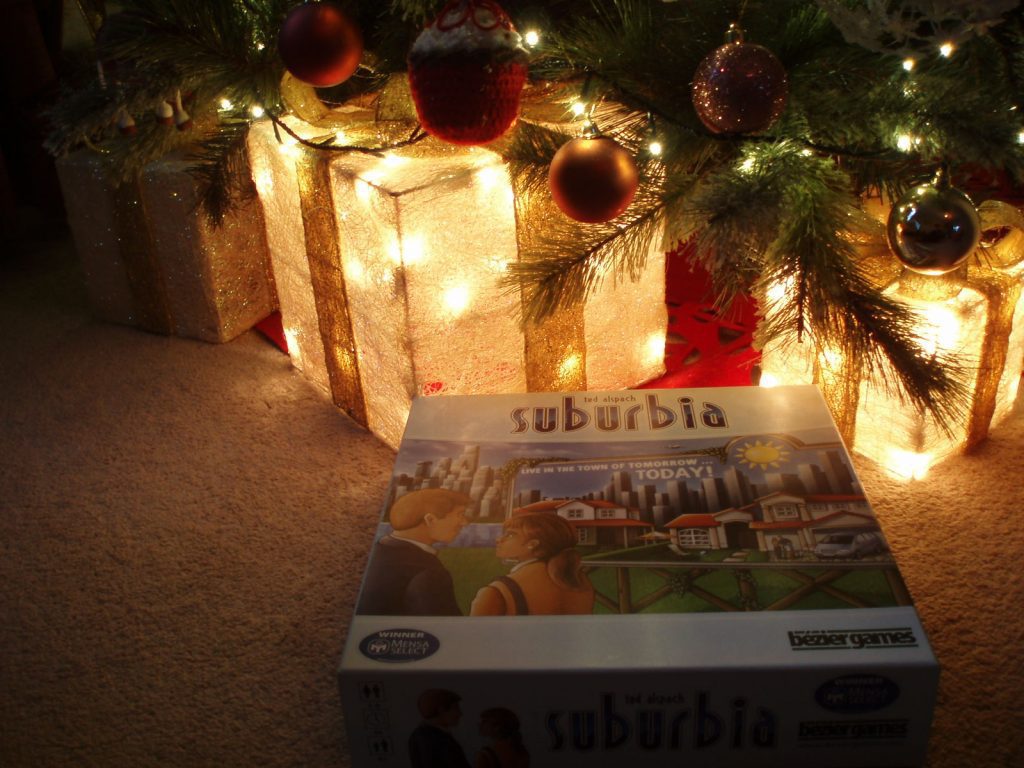
Suburban Spawn
2014 saw Bézier Games release Subdivision, a game that marketed itself within the Suburbia brand. A lighter, almost roll-and-write game, it utilised a tile-drafting mechanic, had even blander artwork and stripped away all of Suburbia’s character and charm. ‘Nuff said.

Suburban Suitability
“Down on my knees in suburbia, down on myself in every way.” David Bowie.
I’ve never made a suburb that I would actually want to live in. I’ve tried, honestly I have. I’ve tried to build houses and parks, businesses and restaurants. But each time my plans are corrupted by my addiction to those sunny industry tiles. I’ll treat myself to a factory, just to get the cash flowing and then before I know it I’ve streaked yellow industry across my suburb like a drunk in an alleyway. The only balance I can reliably obtain is to thrust education at my suburb, creating an urban sprawl of simmering tensions between blue collar factory workers and stuck-up students. Somewhere down amongst my cardboard streets the plot of Good Will Hunting plays out again and again.
Suburban Sketch Part 3
I have an idea for an expansion that I’m calling Suburbia Big Business. It would consist of a series of cards representing large construction companies and developers. Players could gain financial backhanders for sub-optimal property placement, representing the blurred relationships between town planners, local government and big business.
Suburban Spread
Suburbia has one of the essential expansions in the form of Suburbia Inc. There’s some guff in the rules about keeping the tiles separate and adding them in the right balance, but frankly a weakness of Suburbia is the amount of time you can spend sorting out tiles and I’ve just mixed it all in, forgetting that it’s even there.
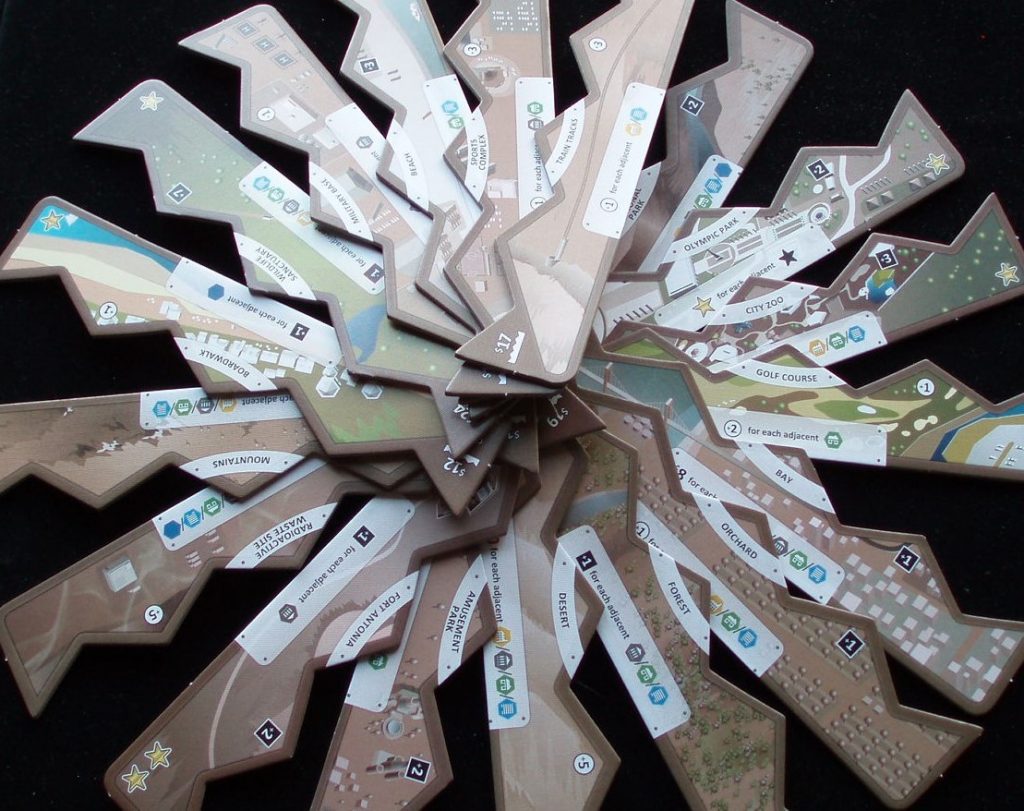
The few added properties are satisfyingly interesting – the cemetery, for example, gives you money at the cost of your population. Really, though, you come for the long border tiles: undulating parks, businesses and, yes, industry. They open up fresh pastures for expansion whilst simultaneously making other areas of your suburb trickier to build in. You might only buy one or two a game but the impact they have on your status and the spatial puzzle itself is huge.
Surely the ‘Inc.’ stands for ‘include’?
Suburban Successes
I am genuinely hopeless at Suburbia. This doesn’t diminish my enjoyment of the game.
Suburban (S)cynicism
You find yourself crossing your real-world beliefs during a game of Suburbia. The theme is just so relatable. Few of us will ever actually be presidents, space lions or silkworm farmers but 55% of the world’s population live in urban areas. Suburbia is the everyday; it’s all around us.
Each time you place a fast-food restaurant next to an elementary school you betray everything you stand for. But if it brings in the surge of income you need at that moment then you do it anyway. It’s for the greater good, you tell yourself. The certainty that similar decisions have been made for similar reasons in the area where you actually live can be overpowering.
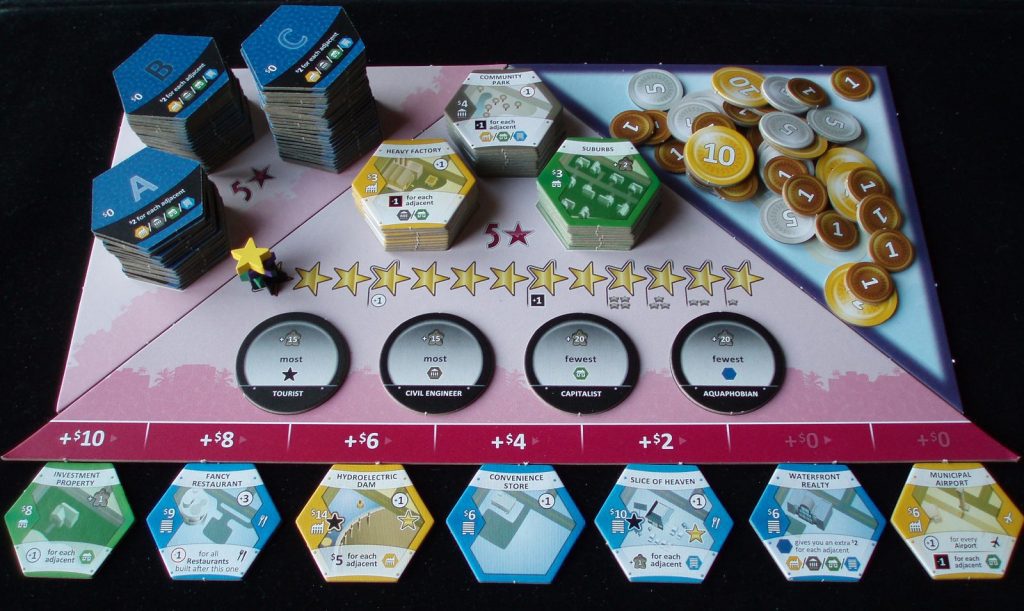
There’s a new affordable housing development close to where I live, with an expected 450 homes to be built next to a dual carriageway (divided highway). The road has new speed restrictions designed to reduce illegally high levels of poisonous nitrogen dioxide in the surrounding area. Where better to build houses for young families?
The new homes will have great transport links so presumably there’s been a nice income boost somewhere along the process. It’s hard not to see all local urban development decisions in terms of Suburbia’s income and reputation tracks, and harder still knowing it’s not the residents who gain those bonuses.
Suburban Sprawl
“You always seemed so sure that one day we’d be fighting in a suburban war, your part of town against mine.” Arcade Fire.
The eagerly-anticipated second expansion, Suburbia 5 Star, was not as well-received. The 50 new property tiles all have star ratings and include fun fairs, statues, themed restaurants and other attractions. Through these properties players advance up the new star track, vying for turn order and enabling the most exciting suburb to entice people from the most boring suburb.
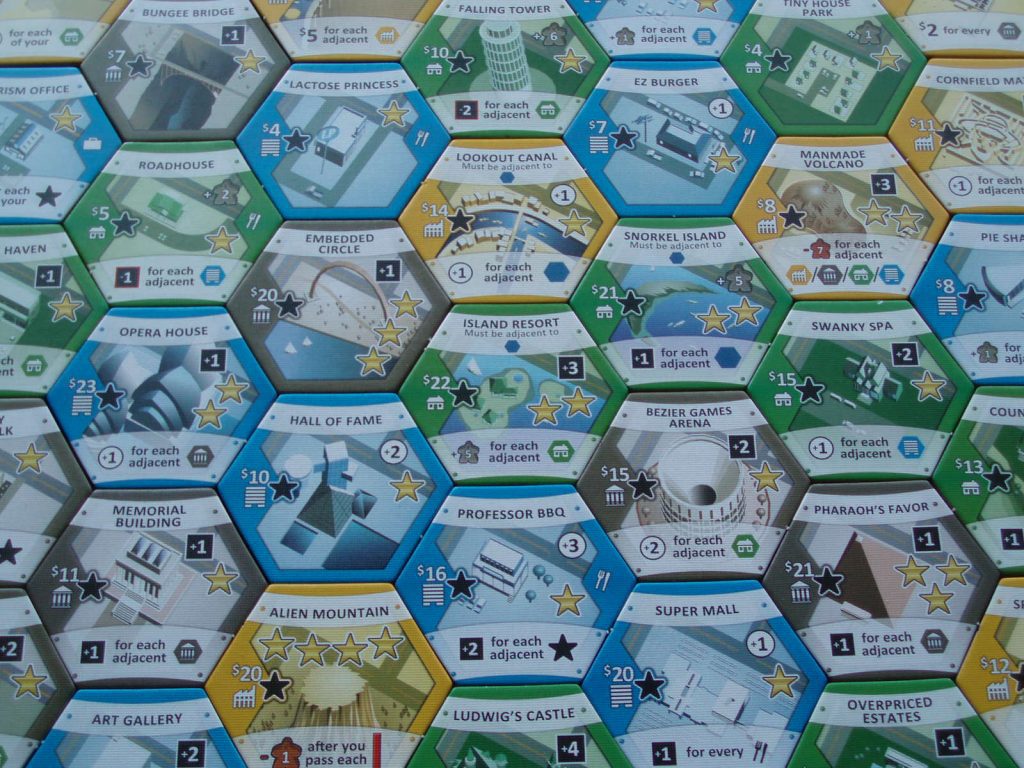
Released in 2015, you can practically taste the previous year’s Castles of Mad King Ludwig. Sure, there are a lot of silly references but it’s all quite superficial, lacking the depth of the core game and Suburbia, Inc. The additional decisions that come from Suburbia 5 Star can be interesting and fun but it dilutes the game’s crispness and slows it down. Worst of all, it fails thematically: gimmicky attractions are a reason to visit a town, not to move there – who wants to be living right next to a theme park?
The second expansion is 5 stars… out of 10.
Suburban Sketch Part 4
I have an idea for an expansion that I’m calling Suburbia Environment. It would provide stickers to be added to every tile, showing carbon emission scores for each property. Carbon rating would boost reputation provided that income was higher, representing the corporate desire to be environmentally friendly just so long as it doesn’t impact upon profits.
Suburban Screen
Released in 2013, the Suburbia app was one of the earliest board game adaptations. The bugs of version 1.0 are mostly fixed in version 2.0 but there’s no online play (at least in the Android version). What it does have is pass-and-play functionality, AI opponents, and a single player campaign that sets the player challenges to build their suburbs in certain ways, altering the core puzzle in interesting ways. It’s too short and could do with clearer rules explanations for each level but it’s fun whilst it lasts.
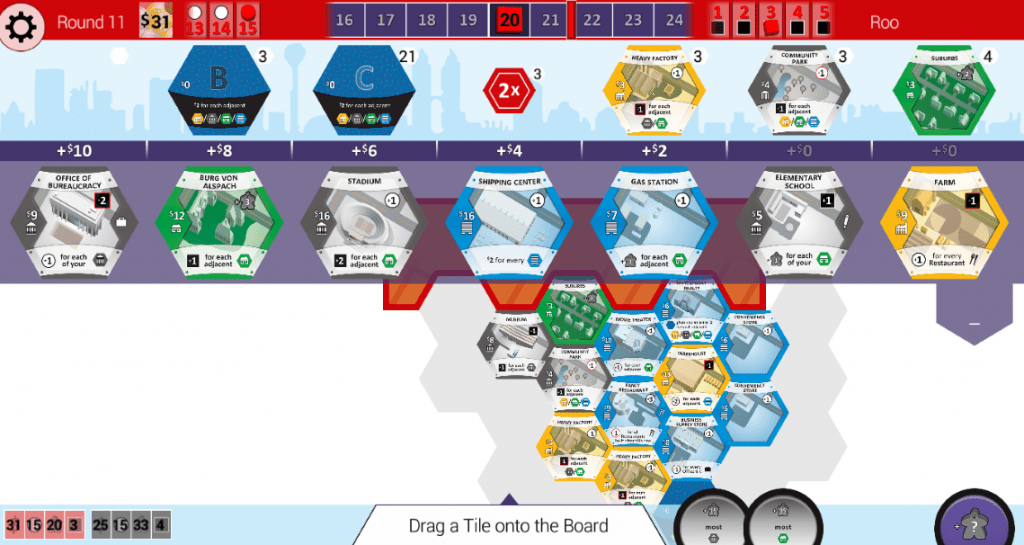
Overall it’s a perfectly fine app, neither knocking your socks off nor frustrating you too much. Screen size makes a huge difference and you may struggle towards the end of a game when there’s spatially more to keep track of and you have to keep zooming in and out. On the flipside, the app shows the effect of each tile before you confirm its placement which helps with learning how to play.
Nothing to write home about but the app is a solid implementation of a great game.
Suburban Speculations
“Ballardian town planning” Quentin Smith, review of Suburbia in The Guardian.
It’s a shock to realise that J.G. Ballard died over 10 years ago. Ballard was one of the most distinctive and innovative authors of the 20th Century*, earning his own adjective in the Collins English Dictionary, his writing all “dystopian modernity, bleak man-made landscapes and the psychological effects of technological, social or environmental developments.”
My love for Ballard’s books eclipses even my love for yellow industry tiles. In his description Quinns is spot on and part of my enjoyment of Suburbia may even result from knowing I’m creating backdrops for Ballard stories that will remain unwritten.
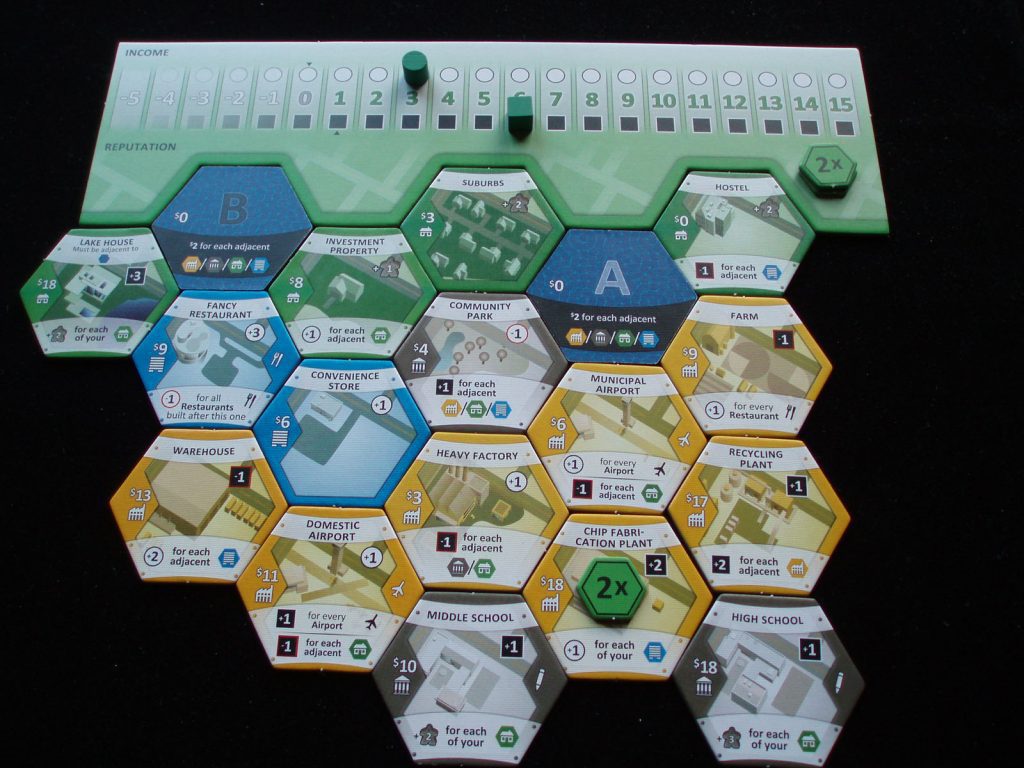
It throws up worrying questions about the way I play Suburbia and my tendency to lose. Has my love for Ballard’s work fuelled my addiction to heavy factories and warehouses? Am I exposing a subconscious nihilistic psyche with each yellow industry tile placed? Do I practice a form of self-destructive sabotage by over-industrialising and then revelling in the consequences of my own corporate filth?
I genuinely don’t know the answers to these questions.
Suburban Sunset
“These nights of suburbia go on and on and on and on and on.” Pulp.
The latest Suburbia expansion, Nightlife, can only be experienced if you own the Collector’s Edition or have the Suburbia app, and Bézier Games currently have no plans to release Nightlife for the standard edition. You can see the logic (it’d require a whole new set of artwork and production to match the original) but it’s still galling, a betrayal of fans who’ve already invested in the standard edition and its expansions and kept the Suburbia flame alight.
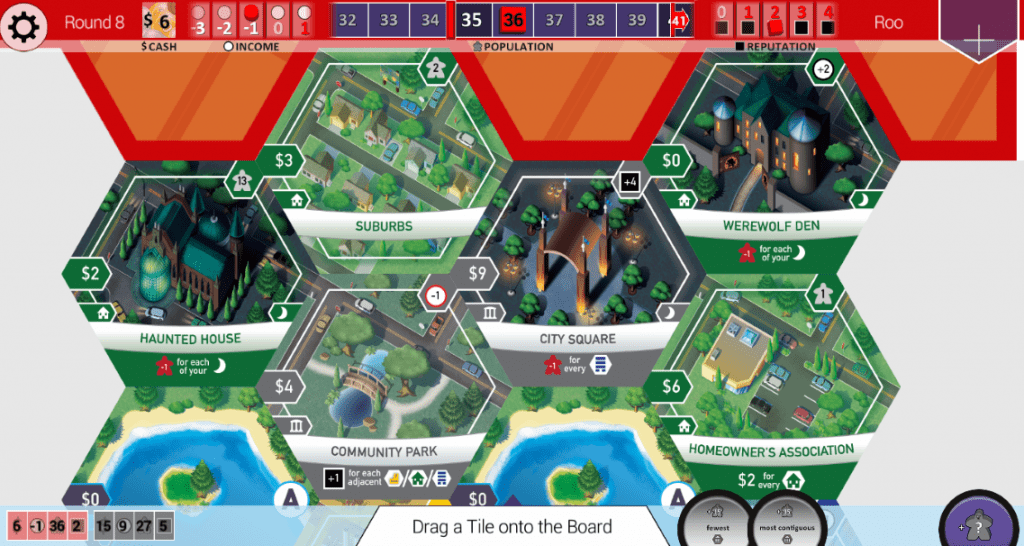
The Nightlife expansion hints at the crime that pervades urban environments. The expansion consists of a collection of new property tiles that often provide cheap and instant fixes with negative consequences in the long run. The (initially) free Back Alley, for instance, gives you a decent boost to income in the early game but will cost you for each additional Nightlife property you place. There’s nothing dramatic like the long border tiles or star track of earlier expansions but the new tiles are a nice addition that subtley change the hue of the base game.
Whilst not essential, Nightlife is definitely worth staying up for.
Suburban Stop
These days I’m less certain that the suburbs are so completely awful. I’m less certain of many things. Age weakens youthful assurance, experience teaching that certainty should be hard-won, should be earned.
But Suburbia will never leave my board game collection. Of this I am certain.
“The future is just going to be a vast, conforming suburb of the soul.” J.G. Ballard.
* If you’ve not read any of J.G. Ballard’s work then The Drowned World, High Rise or Super-Cannes are all good starting points. Avoid Crash or The Atrocity Exhibition until you’ve ventured a little deeper into the grainy murk of his more experimental writing.


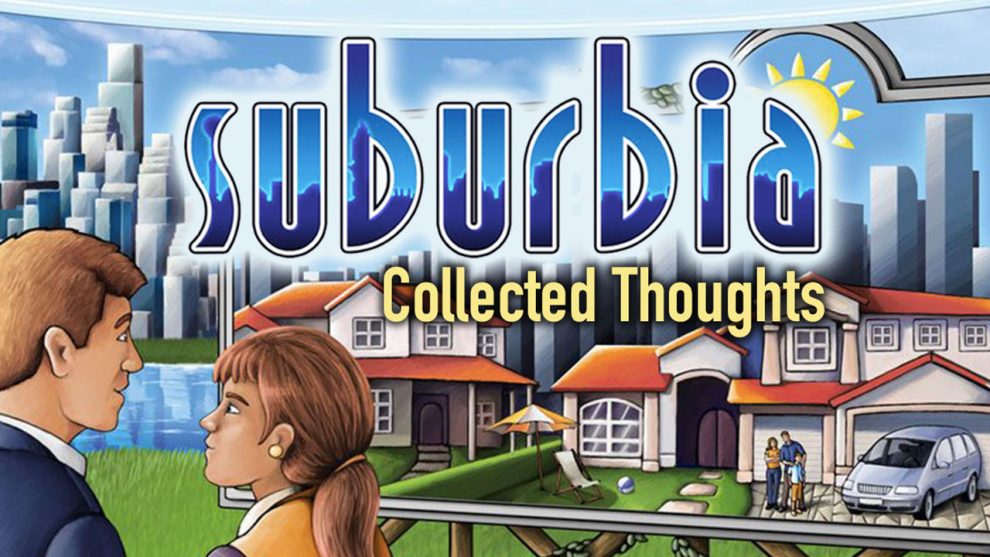

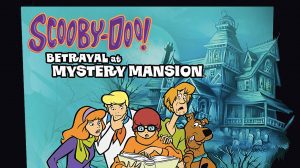







I love Suburbia; I like what you say in this article… that said, the structure of this article made it difficult to read. The scattershot lack of focus seems too random. The general themes and things you had to say (if I am following) I agree with. But the sideline comments interspersed within the primary narrative are distracting… it took me a couple of reads to get the whole in my head.
Hi Kenneth, Thank you for you comments, I’m glad you liked the overall gist of what the article is saying. Suburbia is a fantastic game but given it was released in 2012 there have been a lot of reviews already written about it. The idea was to avoid writing a straightforward review, to instead try and capture more about why the game is special beyond its mechanistic qualities. Some games get under your skin, stimulating thoughts beyond the confines of the game itself – about tabletop gaming more broadly and the wider world. The gaming landscape has changed dramatically since 2012, yet despite the various successors Suburbia remains a much loved game, as the recent kickstarter for the collector’s edition showed.
I wanted to try and explore all those aspects and more in this article, to tackle why Suburbia is an important game, both to me personally and to hobby. I deliberately chose to use a non-linear narrative to help with the pacing and tone, and to keep the broader (and more cynical) themes of the piece subtly in the background without overwhelming the actual review parts – finding the balance was tricky and I can appreciate that it might not have worked for everyone.
I very much appreciate you taking the time to read the article (a couple of times even) and letting me know how you got on – thank you!
Thanks for this grate righting. This is the kind of things that make me know that there is many smart people playing great games this days. I am on the fens about suburbia. I actually play with a group, but some games are more appealing to me for solo play, and that is the case for Suburbia. I am not kin to bots and automats, but I wonder if the simpler solo variant is good. Have you tried it?
Tankes in advance
Hi Gerardo, thanks for the lovely words, I’m glad you enjoyed it. I’m not a huge player of solo games so I’ve only tried it once and wasn’t bowled over. You lose a lot of the interaction with other players’ suburbs and on the tile market. Its not bad (the within suburb combos and tile placement decisions are still fun and that population track-income-reputation balance is remains a teasing puzzle) but I think there are probably better solo games on the market. If I want to play Suburbia and there’s no one around to play against then I’ll play the app rather than the solo mode. Hope that helps!
Hi Andrew, afther more than one year afther, i finaly got the game, in the collector’s edition, in a fine trade.
I like it, but i have been feeling unrest about the incusion of expantions, feeling that the balance will be a mess.
What do you recomend to add, and what do not, or how to do it.
Hope you can give some feedback.
Thanks again and hapy gaming.
Hi Gerardo, Glad to hear you like the game, that collector’s edition looks stunning! (despite my love and connection for my original edition I’m jealous!)
For the expansions I know there are guides about how to add them in the rules but I personally just added all of Suburbia Inc. into my base set – there aren’t a huge number of tiles and whilst they do dilute things a bit it’s really not such a huge amount to bother me too much about dilution and I just like the tiles, some of them feel really clever.
For 5 Star I tend to mix them about 50% base game and 50% 5 Star (I think that’s what’s recommended in the instructions) but will always ensure that everyone playing is aware of the impact of the tiles on the various categories – there are loads of restaurants in the 5 Star expansion but far fewer things like airports or businesses. It really skews the balance for some things so its not one to play with if you’re looking for that razor-edged balance that the base game has. But if people know what to expect then it’s fun, just a fairly different experience (I don’t tend to separate out Sub Inc. when playing with 5 Star but that’s more because I’m lazy and I didn’t feel much difference when I played 5 Star with and without Inc., but that’s possibly just me).
I’ve never played Nightlife in real life, just on the app but I think it would work best by itself with the base game – it introduces a new tile type so you want to make sure that there are plenty of those in the game otherwise their effects aren’t as meaningful.
Hopefully that helps!